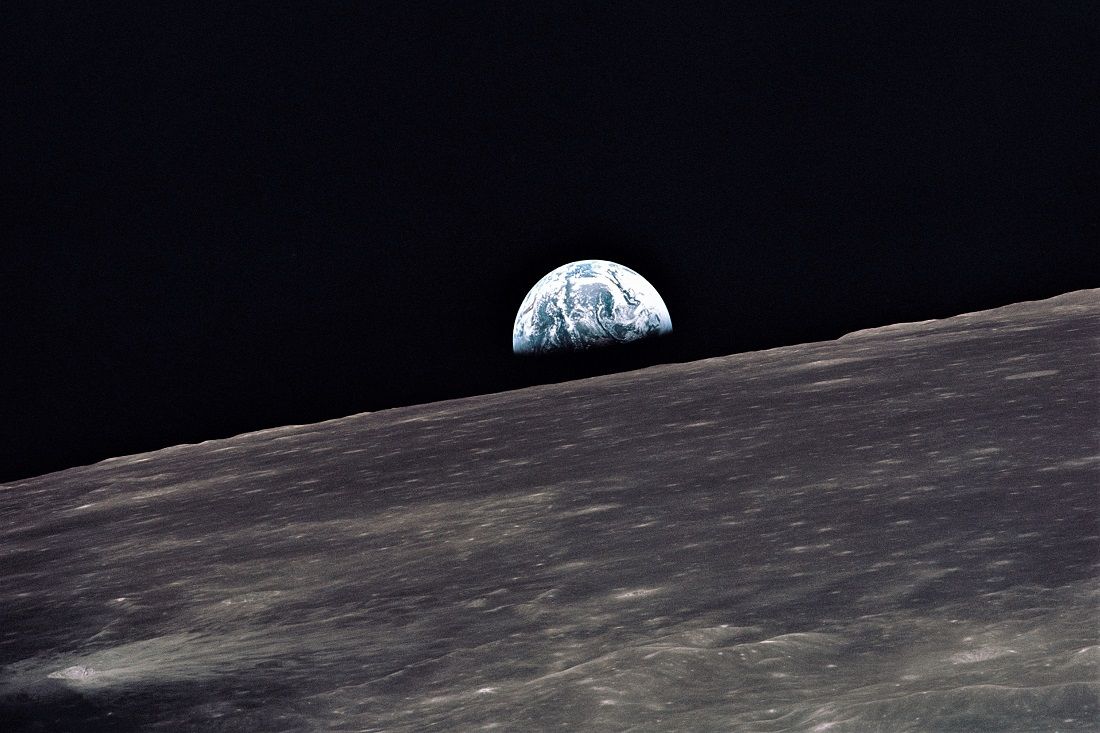The New Evangelization is not about measuring up to science and speaking to its disparate methods.
Science matters. Right? If idle chatter on the internet is to be believed, then absolutely. Neil DeGrasse Tyson’s tweets are consistently in the news, and, even if not the force he once was, Richard Dawkins remains a household name. The latter continues to go around endlessly delivering lectures; the former has begun to spin himself as the voice of reason in a disordered age by appointing himself and the unofficial editor of President Trump’s proposed space force. Benedict XVI, of course, called Dawkins’s The Selfish Gene “a classic example of science fiction.” Meanwhile, laughing at Neil DeGrasse Tyson is basically a parlor game in some circles. And yet, somehow, we are told that religion must speak to science.
As the number of “nones” in the United States grows, we have been tasked with finding a way to convince them that the Catholicism does not stand in opposition to reasonable, scientific inquiry. There is no shortage of write-ups arguing that the Scopes Monkey Trial is a thing of the past. A Belgian priest gave us the Big Bang! The popes have said evolution is okay! Science can, in fact, be shown to validate religious principles! Neurobiology vindicates faith!
While this spirit has seized many in the Church, theorists and sociologists have been dissecting and criticizing the limits of scientific inquiry. Jacques Lacan, Bruno Latour, and Graham Harman, among others, have pointed to the limits of the scientific paradigm. In a related vein, Talal Asad and Saba Mahmood have argued for instability of secularism, often painted as a handmaid of unbounded scientism. And yet, it seems, many Catholics remain dedicated to squaring the scientific circle. “The two are compatible,” we say, “if only we could get the world to believe it.” Or, as an interviewer from Our Sunday Visitor, asked one young agnostic: “Some think that the scientific worldview is opposite of religion, and some people think they go together. Has science and the scientific worldview become more persuasive to you than religion?”
Looking at the data, however, paints a complicated picture of why and how people come to identify as “nones.” A sort of New Atheist faith in science plays some role, but it is by no means the only—or the predominant—way that people come to leave institutionalized religion. A Catholic approach to evangelization cannot merely—or mostly—operate on the premise that the integration of science and religion will help appeal to “nones.” In fact, a multifaceted path will be necessary, one that, above all, pays attention to narrative and representation as ultimate guiding forces in the modern world. Meaning matters.
None Numbers
Millennials are more likely to identify as “nones” than other groups, according to Pew. They are also more often male, white, and single, according to the same study. The majority disaffiliate before they are 18; most are raised in religious (defined very broadly) households, though some are not. Perhaps most jarringly, those who are unaffiliated at a young age are apt to remain so (a major break with previous trends).
“Nones,” however, fall into three groups: atheists, agnostics, and nothing in particulars. Among “younger Millennials,” 36% are “nones.” Their composition is 6% atheist, 7% agnostic, and 23% nothing in particular. In other words, the vast majority of unaffiliated young people are not even agnostics, and definitely not atheists; they are generally just, well, unaffiliated. 80% express some degree of belief in some sort of “god.” 67% report that religion is either “very” or “somewhat” important to them. 57% pray or meditate at least weekly.
All this seems to suggest that there is more going on than a bunch of people deciding that science rationally disproves the need for a deity or piety of some kind. The majority do not seem to espouse a Dawkinsian irrational rationalism. This reality is borne out by the reasons people report for becoming unaffiliated. 54% said something other than “don’t believe” when asked why they left; this includes those who feel alienated by the hierarchal nature of many religious organizations, those who have had negative experiences with religion, and those who believe but do not participate. The same survey shows that, among agnostics and those who are “nothing in particular,” no longer believing is not as important a reason for disaffiliation as it is for atheists. In other words, while some people cite science, or at least some rational disproof of religion, for their lack of religious affiliation, it is by no means a primary cause.
Catholics, in particular, seem to lose people for what we might call “social reasons”:
Notably, those who were raised Catholic are more likely than those raised in any other religion to cite negative religious treatment of gay and lesbian people (39% vs. 29%, respectively) and the clergy sexual-abuse scandal (32% vs. 19%, respectively) as primary reasons they left the Church (PRRI).
Note that this study was released before the Pennsylvania Report and before everything came out about McCarick.
The reasons people leave religions are thus complicated. All of those who leave are not necessarily without belief of some kind, and even those who are leave for many different reasons: some political, some personal, some stemming from apathy. The situation on the ground cannot be reduced to a battle between reason and un-reason, religion and science.
Astrologos
With all of this in mind, we ought to think about a phenomenon now increasingly popular with Millennials (including, and perhaps especially, Millennial “nones”): astrology. At first, this practice involving the signs of the Zodiac may strike people as nonsensical. It is an affront to reason; no one could actually believe in that sort of thing. Such protests are ironically somewhat correct; finding astrology helpful is not a question of faith, but one of narrative and representation, one that tells us quite a bit about how Millennials understand religion and spirituality.
This shift is quite recent and has not merely taken up New Agers and yogis. Julie Beck, writing in The Atlantic, summarizes the situation well:
For some, astrology’s predictions function like Dumbo’s feather—a comforting magic to hold onto until you realize you could fly on your own all along. But it’s the ineffable mystical sparkle of the feather—gentler and less draining than the glow of a screen—that makes people reach for it in the first place.People are starting to get sick of a life lived so intensely on the grid. They wish for more anonymity online. They are experiencing fatigue with ebooks, with dating apps, with social media. They are craving something else in this era of quantified selves, and tracked locations, and indexed answers to every possible question. Except, perhaps the questions of who you really are, and what life has in store for you.
Ruby Warrington is a lifestyle writer whose New Age guidebook Material Girl, Mystical Worldcame out in May 2017—just ahead of the wave of astrology book sales this summer. She also runs a mystical esoterica website, The Numinous, a word which Merriam-Webster defines as meaning “supernatural or mysterious,” but which Warrington defines on her website as “that which is unknown, or unknowable.”
“I think that almost as a counterbalance to the fact that we live in such a quantifiable and meticulously organized world, there is a desire to connect to and tap into that numinous part of ourselves,” Warrington says. “I see astrology as a language of symbols that describes those parts of the human experience that we don’t necessarily have equations and numbers and explanations for.”
Astrology, in other words, is not conceived of as anti-scientific, nor is it necessarily considered an alternative to institutional religion. It is a way of representing one’s experience to oneself. If you know things are supposed to be hard right now, it is easier to bear them; if you know things are set to get easier on a certain date, then you can look forward to it, preparing yourself for joy, and thus actually cultivating it within yourself. It affords people a non-religious way to make sense of their experiences, one that requires “faith” only in the ability to use a common language; it does not demand any kind of rational assent or submission, merely a willingness to listen and categorize. Some are true believers, but most are not—and the kicker is: it does not even matter which you are. Astrology, as Beck writes, “is fake but it’s true.” That is precisely what makes it attractive.
This realization adds to what the numbers show: it’s not necessarily about reason and science, at least not entirely. As the Church, we’re tasked with evangelization, and, in terms of this new generation, that means appealing to this need for representation and narrativization, appealing to the desire for meaning and significance. Our audience is not, by and large, atheistic scientists, but skeptical, seeking, paradoxical young adults—myself included.
Logos
Taking this tack is ultimately very Catholic, because it abides by the Church’s longstanding critique of a voracious, capitalistic culture—a culture dedicated to rationalization, quantification, and the reduction of the human to homo economicus. Our time knows no shortage of pieces about STEM and the need for young people to study the sciences so that they may be successful and support themselves. Not only is the Church supposed to turn to science to convince the unbelieving but so are the people of the world supposed to turn to it as a means of economic liberation.
This tack runs counter to exhortations from recent popes, especially Pope Francis. Our job, it seems, is not to enable a culture that demands that we conform to the prescriptions of vaguely-defined science; rather, we are tasked with announcing the Good News, such that science remains within its rightful bounds, simultaneously evangelizing and resisting the logic of the times. Just as astrology seems to offer some respite from day jobs in software engineering, so may the Church offer Jesus Christ and true religion as alternatives to a culture of quantification and commodification. As Pope Francis writes in Evangelii Gaudium, “We are in an age of knowledge and information, which has led to new and often anonymous kinds of power” (§52). He continues:
While the earnings of a minority are growing exponentially, so too is the gap separating the majority from the prosperity enjoyed by those happy few. This imbalance is the result of ideologies which defend the absolute autonomy of the marketplace and financial speculation. Consequently, they reject the right of states, charged with vigilance for the common good, to exercise any form of control. A new tyranny is thus born, invisible and often virtual, which unilaterally and relentlessly imposes its own laws and rules. Debt and the accumulation of interest also make it difficult for countries to realize the potential of their own economies and keep citizens from enjoying their real purchasing power. To all this we can add widespread corruption and self-serving tax evasion, which have taken on worldwide dimensions. The thirst for power and possessions knows no limits. In this system, which tends to devour everything which stands in the way of increased profits, whatever is fragile, like the environment, is defenseless before the interests of a deified market, which become the only rule. (§56)
Admittedly here Pope Francis does not seem to be discussing STEM. But he is talking about a culture and economy that beg us to foreground the practical sciences; he is excoriating the excesses of a historical moment in which the primacy of the human desire for meaning is set aside in the name of financial gains. In sum, Pope Francis argues that our moment—the one in which we live right now—is placing too much emphasis on “scientific” ways of knowing that allow for rampant quantification, ones that reduce us to money-making machines of the sort that often end up turning to astrology to fill the spiritual void.
In the encyclical, the pope argues that counteracting such forces is the substance of the New Evangelization. Joy can only be revived in a world that takes seriously the spiritual rift left in the hearts of those beaten down by demands of efficiency, transparency, and financial success:
The great danger in today’s world, pervaded as it is by consumerism, is the desolation and anguish born of a complacent yet covetous heart, the feverish pursuit of frivolous pleasures, and a blunted conscience. Whenever our interior life becomes caught up in its own interests and concerns, there is no longer room for others, no place for the poor. God’s voice is no longer heard, the quiet joy of his love is no longer felt, and the desire to do good fades. This is a very real danger for believers too. Many fall prey to it, and end up resentful, angry and listless. That is no way to live a dignified and fulfilled life; it is not God’s will for us, nor is it the life in the Spirit which has its source in the heart of the risen Christ. (§2)
The future of the Church, it seems, cannot merely be appeals to a rational world of scientific quantification; in fact, it must transform just such a culture in the name of Jesus Christ.
Evangelize!
The good news is that this releases the Church from having to justify its position constantly in terms of scientific studies and methods. Neurobiology might help to make a certain point, but it is not an indispensable handmaid of Catholic theology to be drawn on to validate our premises. This does not mean one cannot turn to the sciences. Indeed, they may be useful. But the work of evangelization will take all types; it will take something of a “Jesuit approach,” one that attempts to be all things to all people. It must present the face of Br. Guy Consolmagno even as it manifests the love and respect for the human person called for by Pope Francis, and the respect for the narratives we tell ourselves as Fr. Michel de Certeau might suggest.
Such an approach will help to liberate the Church from its constant desire to demonstrate its own adequacy before science, just as it will appeal to the majority of “nones”—people who are seeking meaning and precarious faith in a world of rationalization and commodification. The Church must reach out beyond a desire to demonstrate its scientific rationality and instead demonstrate the relational rationality of its humanity, its joy—in short, its love. To the atheists, the agnostics, and the astrologers, it must be firm in saying with Pope Francis: “[t]he joy of the gospel fills the hearts and lives of all who encounter Jesus” (§1).
This ironically vindicates the old political slogan, “It's the economy, stupid” in two senses.
- Economic greed and exploitation appear to be the real reason for the floating away of nones.
- The economy of salvation—foolishness, stupidity, to the interlocking worlds of politics, finance, and the sciences—is what can save us from the former.


